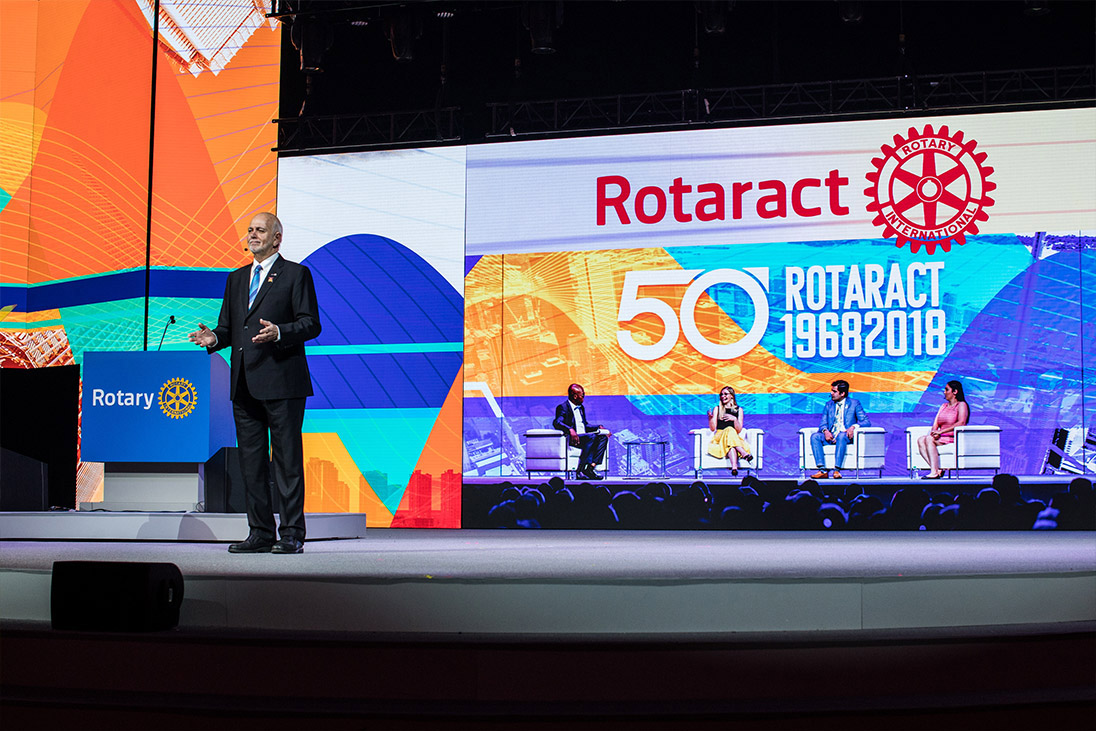Rotary International President, Barry Rassin, has urged more Rotaract clubs to be formed in these isles to attract a younger generation.
Speaking on the first day of the Rotary Annual Showcase in Nottingham, Barry insisted that the future of Rotary’s growth rested on the development of Rotaract, which is targeted at men and women aged between 18 and 30-years-old.
There are currently 62 Rotaract clubs in Great Britain & Ireland, working alongside over 1,700 Rotary clubs in the five countries.
The Bahamian-based head of one of the world’s biggest service organisation was instrumental in changes made at the Rotary Council on Legislation in Chicago last month which elevated the status of Rotaract club, increasing the support they receive from Rotary International (RI).
And now there is greater flexibility within Rotary, the RI President said it was inherent on clubs to look at how they ran themselves – addressing key issues of when they meet, what community work they do, and even cost, to make the organisation a more attractive proposition to new members.


Barry Rassin spoke at the Rotary International Convention 2018 in Toronto about the importance of Rotaract to the future of Rotary and has made it a key focus of his time as President.
He added: “We have got wonderful people doing wonderful things, but we need to think a little differently.
“We are 114-years-old, it is time to re-invent ourselves.
“For those clubs who aren’t going to re-invent themselves, we have to start new clubs next to them.
“We have to start new clubs modelled on today’s world to ensure we are more relevant to people in our communities, and that is what they want.”
Barry, a member of Rotary East Nassau in New Providence, Bahamas, would like to see Rotary clubs supporting the growth of Rotaract within their communities. This, he believes, would address the age and gender imbalance which exists within the organisation.
A new Rotaract Club chartered in Nottingham, England. #ElevateRotaract #betheinspiration pic.twitter.com/iTAH5cEXCJ
— Barry Rassin (@RotaryRassin) May 10, 2019
“I think we have made big headway with this,” he said. “I wanted to increase our social media exposure and, with the help of Rotaractors, we have done that to a great extent.
“We should be letting communities know who we are and what we do, instead of continuing that perception that we are bunch of old, white people who have lunch together. That has begun to change.
“There is an excitement which I feel everywhere I go about Rotary, about our possibilities and who we are. And that makes me feel really good.
“It is a long term aim for us to reduce our average age – it is going to take some time, but we are on the right path, and that’s what counts.”
Looking at Rotary more broadly, the Rotary President said he wants to encourage clubs to think carefully about how they do Rotary.
Sometimes we are not as good as we should be in telling our communities what it is we do. We need to be better at all of that.”
“We are talking about meeting at the right time,” he explained.
“Today, people don’t want to compete with their family and their job. So what is the right time of day? Lunch probably isn’t it.
“Right after work seems to be what works, but that may be different in Great Britain & Ireland.
“We have to consider what is the best time of day to meet, how do we keep the cost of being a member low? People don’t mind giving for service, but they don’t want to be spending lots of money on lunch and dinner.
“So how do we keep costs down, how do we involve our families, how do we ensure that we are doing the mentoring we should be doing with each other?
“Young people should be mentoring us, older people should be mentoring them. It has got to work both ways, because young people have a good handle on today’s world and what it is like.
“We have amazing experience, and if we both share which each other, we both do better.”
With six weeks left of his reign as Rotary President, Barry described his time at the helm as “fantastic”.
“It has been a great year and we have accomplished some things,” he said.
“We have got people thinking how certain things need to change a little, to go in a better direction, and I am very optimistic. I think we have got a great organisation, doing a lot of great work.”
And that change means providing best value to Rotarians and to the communities they serve.
“Sometimes we are not as good as we should be in telling our communities what it is we do. We need to be better at all of that,” he added.
But there remains a firm sense of optimism for the future of Rotary which, the RI President believes, is the best humanitarian organisation in the world.
“We are doing a lot of the right things, but when you are at the top and there is no-one really in front of you, it is more difficult,” he pointed out.
“What we need is a push to stay there. We can’t be a leader unless you continue to think about what kind of person and why kind of organisation should we be to continue leading this pack. We are the best, so how do we stay the best?
“We cannot be complacent. That is critical.
“Our average age is just simply too high and we are not perceived as a young, dynamic organisation.
“It’s not that we have to be young, but we have to have a good balance – a balance of age and a balance of gender. We are making progress, but I am an impatient person and we need to move faster.”









